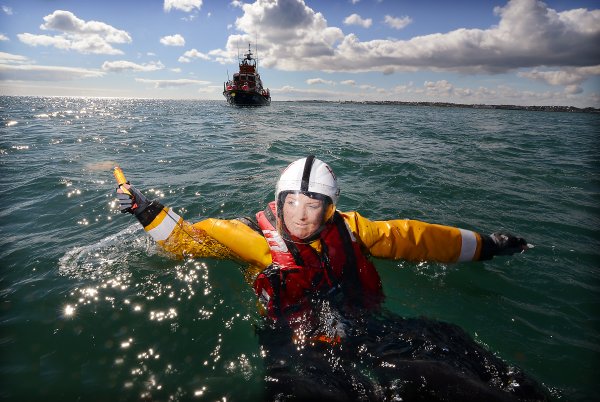FALL into the Irish Sea and even if you escape drowning, because you are wearing a good lifejacket, your chances of surviving more than an hour are slim. Our coastal waters reach little more than nine degrees centigrade even in summer and hypothermia sets in fast as the body temperature drops from its normal 37 degrees.
First you begin shivering. Then you experience extreme tiredness, rapid breathing, cold and pale skin. As your temperature drops into the danger zone the shivering becomes more violent. It will stop completely before you become delirious and struggle to breathe. Finally you lose consciousness. Hypothermia is fatal unless you are swiftly removed from the water and treated properly.
The volunteers of Donaghadee’s Royal National Lifeboat Institution Lifeboat, Saxon, regularly practice a Man Overboard routine in expectation of another busy summer season. The town’s £2 million Lifeboat is at sea within 10 minutes of a rescue alert and can reach a speed of 25 knots as soon as it clears the harbour. It has a range of 250 nautical miles.
The crew includes Andrew Jackson GP who is Lifeboat Medical Adviser. He said, “Our modern Trent Class vessel is equipped to deal with a range of medical emergencies and the crew are trained to treat hypothermia. VHF radio ensures an ambulance can meet the Lifeboat when it reaches harbour or request an Air Sea Rescue Helicopter to bring a casualty to the nearest hospital. But time is the key factor. If you see someone in the water, dial 999 and ask for the Coastguard. Give the location and any additional information which might help our RNLI volunteers get to the scene and deal with the casualty as swiftly as possible.
“Whatever the activity or the ability of the person concerned, water is unpredictable. The RNLI encourages people to stay safe, be prepared and respect the water at all times. People should always be aware of all waterside edges and let someone know where they are going and when they expect to be back.”
The RNLI’s annual May Day appeal starts on April 26. The charity receives nothing from government and relies entirely on the support of the public. It costs £1,527 a year to train a volunteer crew member and around £460,000 a day to run the service. It saves 25,000 people each year around the UK and Irish coasts.

